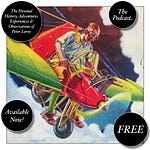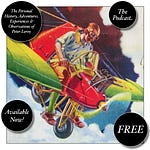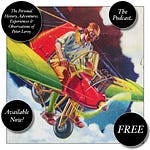7
I KNEW MARGOT AND MARTHA well, but I hardly knew their parents, Andrew and Rosetta, at all. At the time, I wouldn’t have said that, though. I supposed that I knew everything there was to know about them, because everyone in Babbington had an anecdote or two to tell about them, and I had heard quite a few of them. The Glynns were artists, Babbington’s only artists, as far as I knew.
Artists. What can I say? What should I say? I could write a book about the ideas about art and artists that were current when I was a boy, ideas that had their inevitable effect on me, on my ideas, on my art—but this isn’t that book, and I have another story to tell, and for the purposes of this story it will be enough to say that Andy was a painter and Rosetta was a poet. As artists, they were regarded as eccentrics, colorful characters. The anecdotes told about them had a common theme: their blissful detachment from the minutiae of everyday life, the very things that loomed so large in the lives of normal Babbingtonians, like my parents. There were also titillating rumors about Bohemian goings-on, rumors recounted in whispers too low, alas, for me to hear. Among the stories I did hear were the one about Andy Glynn’s forgetting to wear shoes in public (or a belt, or a shirt, or pants, depending on the storyteller), the one about Rosetta’s becoming so entranced with the appearance of a bin full of cauliflower at the market that she bought all of it, every head, and fed her family nothing but cauliflower for a week and a half, and the one—well—I’ll tell it to you as my mother told it to me one night, after we had been visiting some friends of ours, the Fishers.
Visiting was rare for us. My parents didn’t have much of a social life outside the family, but now and then someone would give a little party, and sometimes there would be a gathering that included children, as this had. My parents left the Fishers’ in high spirits, a little tipsy on beer (or maybe it was highballs or old-fashioneds), but higher, I think, on the idea that they belonged to a fun-loving set. I was a little intoxicated by that idea, too.
“So long, so long,” my mother called to Mrs. Fisher. “We had a wonderful time.” She was right. We had had a wonderful time.
“I hope we remember the car!” called my father.
The group on the front steps, waving us off, roared. I supposed that they were laughing at the very idea of my father’s forgetting to drive our car home. It was such a preposterous idea that I laughed, too, without realizing that I was laughing only at the comic surface of a story with a slightly malicious center. My father performed a little business of starting to walk off, hands in his pockets, like a man who thinks he came on foot and doesn’t realize that he’s leaving his car behind. My mother joined in the fun by snagging his coat and dragging him back to the car, where he registered slapstick surprise at its being there. I didn’t know what my parents were up to, but I loved seeing them indulge in comical behavior, whatever its point might be. I wanted to be part of it, so I started walking off, in the way my father had, hands in my pockets, whistling. I got a laugh, too, almost as good as the laughs my parents had gotten, but I didn’t know what I was doing, because I didn’t know the story behind it. I didn’t realize that my father, in his performance, had been alluding to one of the legends of the Glynns, invoking it to get a laugh, and he had gotten the laughter he’d hoped for.
“Oh!” my mother cried, settling onto the front seat, closing the door. “That was hilarious. You were very funny, Bert.”
“Thank you, my dear,” said my father. The voice he used wasn’t his own, and I understood that he was still playing his adopted comic character, whoever that might be.
“And you, too, Peter.”
“Thank you, my mother,” I said. I was good at picking things up. “But I don’t really get the joke,” I admitted.
“Oh!” cried my mother. “That makes it even funnier!” She and my father broke out in laughter again.
[to be continued]
Have you missed an episode or two or several?
You can begin reading at the beginning or you can catch up by visiting the archive or consulting the index to the Topical Guide. The Substack serialization of Little Follies begins here; Herb ’n’ Lorna begins here; Reservations Recommended begins here; Where Do You Stop? begins here; What a Piece of Work I Am begins here; At Home with the Glynns begins here.
You can listen to the episodes on the Personal History podcast. Begin at the beginning or scroll through the episodes to find what you’ve missed. The Substack podcast reading of Little Follies begins here; Herb ’n’ Lorna begins here; Reservations Recommended begins here; Where Do You Stop? begins here; What a Piece of Work I Am begins here; At Home with the Glynns begins here.
You can listen to “My Mother Takes a Tumble” and “Do Clams Bite?” complete and uninterrupted as audiobooks through YouTube.
You can ensure that you never miss a future issue by getting a free subscription. (You can help support the work by choosing a paid subscription instead.)
At Apple Books you can download free eBooks of Little Follies, Herb ’n’ Lorna, Reservations Recommended, and Where Do You Stop? and What a Piece of Work I Am.
You’ll find overviews of the entire work in An Introduction to The Personal History, Adventures, Experiences & Observations of Peter Leroy (a pdf document), The Origin Story (here on substack), Between the Lines (a video, here on Substack), and at Encyclopedia.com.














Share this post